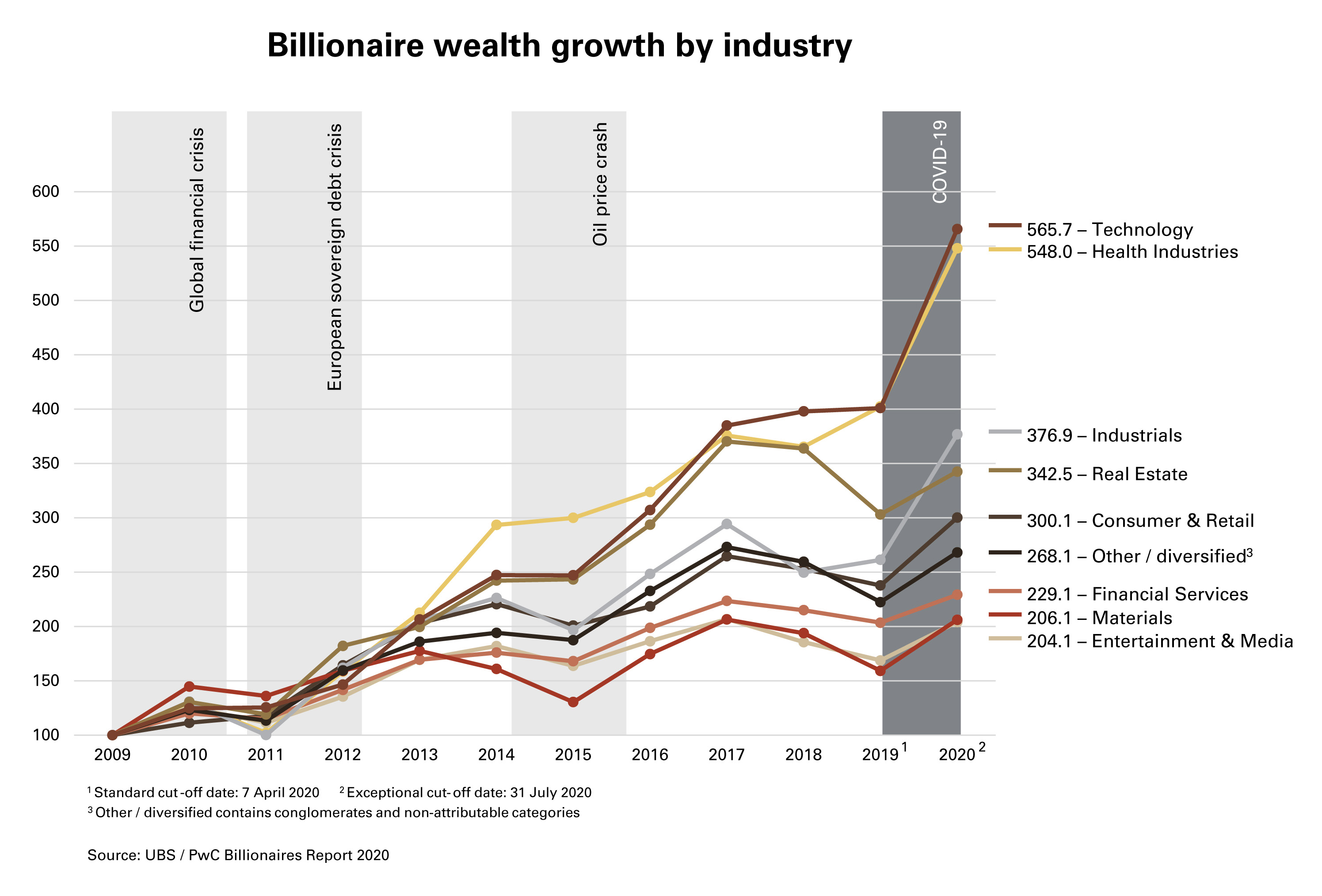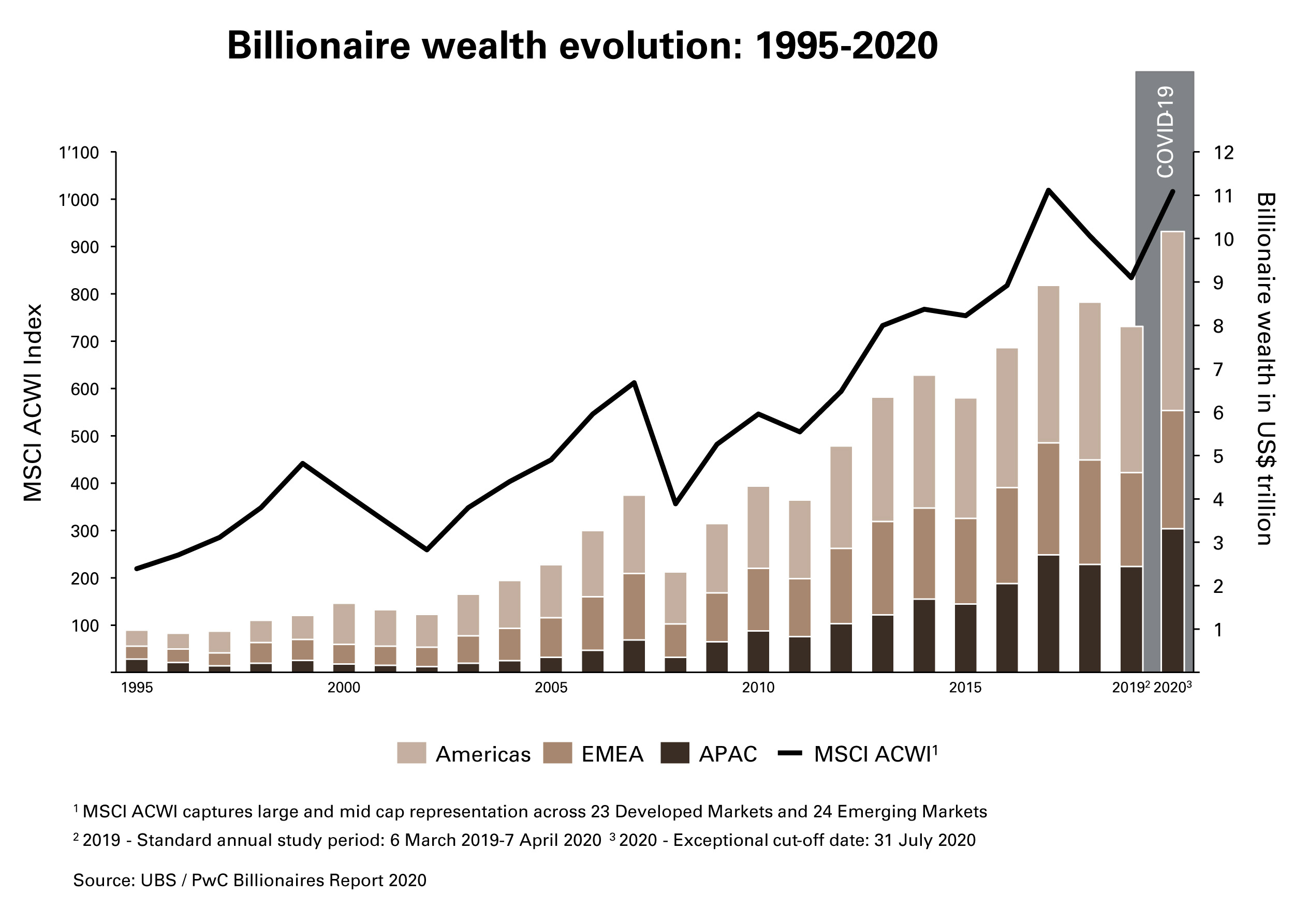While Covid-19 has brought untold misery, losses and disruptions to the global community, a few thousand ultra-rich individuals have seen their net worth grow during the pandemic. According to a new report by UBS and PwC, the combined wealth of more than 2,000 billionaires across 43 markets reached US$10.2 trillion at the end of July 2020, touching a new high after the year’s V-shaped rebound in asset prices.
Billionaire innovators and disruptors in the tech, healthcare and industrial sectors are pulling ahead of the pack, with the health crisis accelerating this divergence, says the 2020 Billionaires Insights report.
Most tech (94%) and healthcare (71%) billionaires are among these innovators and disruptors, although they can also be found in more traditional industries. Within the industrial sector, 54% of billionaires are identified as innovators and disruptors, while the consumer & retail segment has 41%.
Long-established billionaire-controlled tech companies are revolutionizing their sectors. For instance, software giants such as Microsoft and Oracle – both effectively “billionaire factories,” having hatched several billionaires – are quickly moving into areas such as artificial intelligence, cloud computing and software as a service.

Says Josef Stadler, head of the Global Family Office unit at UBS Global Wealth Management: “This is a key moment in economic history. Scientists, computer programmers and engineers are revolutionizing industries at a pace never seen before and they are having a profound impact on the whole of the global economy.
“From AI to 3D printing, from nanotechnology to biotechnology, scientists and serial entrepreneurs are only just beginning to apply and develop radically new products and services that have the potential to reshape the global economy and create tens, or even hundreds of thousands of new jobs as the world rebuilds after Covid-19.”
Observes Anuj Kagalwala, partner, asset and wealth management tax leader, at PwC Singapore: "It is interesting but not surprising that wealth in the tech and healthcare sectors surged ahead at a faster rate than other sectors. In the last decade, the wealth of billionaires in the tech sector grew 5.7 times while the wealth of billionaires in the financial services sector grew 2.3 times. One of the observations is that the financial services is seen to be a slower adopter of technology and innovation than other sectors. Other sectors which have better adapted to technology and innovation such as industrials saw wealth grow 3.8 times during the same period. Technology and innovation seem to be key ingredients for wealth creation.”

Asia-Pacific has the highest number of billionaires globally, with 831 billionaires. They represent 38% of the global billionaire population. From early April to end of July 2020, billionaires in the region who can be identified as innovators and disruptors grew their wealth by 23% to US$1.4 trillion, while traditional billionaires’ wealth increased by a smaller 13% to US$1.2 trillion during the period.
In fact, APAC has the highest share of billionaires in technology and healthcare with 181 billionaires (8%) of the total billionaire population, compared with 153 (7%) in the Americas and 88 (4%) in Europe, the Middle East, and Africa. The report cites the case of Zhong Huijuan, a former chemistry teacher who became the world’s wealthiest healthcare billionaire following the initial public offering of her Hansoh Pharmaceutical on the Hong Kong Stock Exchange in 2019.
Job creation, philanthropy
According to the study, APAC billionaires have shown their resilience in a highly volatile environment. From 2019 to early April 2020 after the stock market sell-off, the wealth of billionaires in the region fell just 2.1% to US$2.4 trillion. This is significantly less than the 10.1% drop in EMEA and the 7.4% decline in the Americas. From early April to the end of July 2020, the wealth of APAC billionaires rebounded by 36% to US$3.3 trillion.
The wealth surge in mainland China is even sharper. Despite the pandemic, there was a new record of 415 Chinese billionaires, with a combined wealth of US$1.7 trillion by the end of July 2020, a staggering 71% jump from 2018. They hold 50% of the combined billionaires’ wealth in APAC and 17% globally, up from 11% in 2018. Of the billionaires in the country, 98% are self-made. By early April 2020, their wealth had grown almost nine-fold over the decade, while that of their peers in the United States had doubled.
While risk-taking and disruption have helped billionaires grow their businesses, they are also contributing much to economic growth and job creation. According to the report, 1,542 billionaires covered by the research own or partly own companies that employ over 27.7 million people worldwide – roughly the same as the working population in the United Kingdom.
In addition to their impact through business innovation, the study finds that billionaires are giving more than at any time in history. Some 209 billionaires have publicly committed a total of US$7.2 billion between March and June 2020 to tackle the pandemic, though that is likely to be only a fraction of the overall amount, given a tendency towards discretion.
Some innovators are also extending their own values to the way their companies approach environmental and social issues. They are seeking to make a positive impact across all activities – philanthropy, corporate and investment – as opposed to looking solely to a charitable foundation.
For example, of the top ten billionaire-controlled companies ranked by sustainability performance, nine are Covid-19 donors and seven also invest in clean technology.
Comments Marcel Tschanz, head of banking advisory at PwC Switzerland: “Billionaires seemed to have taken the pandemic as a stimulus to reconsider where they stand, what their values are and to re-think their own and their family's future. Many have acknowledged the fragility of their achievements and are now laying more focus on securing long-term stability, sustainability and eventually leaving a legacy - for their families, their enterprises and society as a whole."


.jpg)






